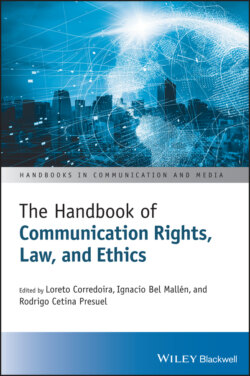Читать книгу The Handbook of Communication Rights, Law, and Ethics - Группа авторов - Страница 16
Freedom of Expression Lies at the Foundation of Communication Rights
ОглавлениеUnderstanding this idea requires an understanding of the true concept of freedom; otherwise we will find ourselves with so-called frustrated freedom. Freedom, historically the fruit of constitutional revolutionary conflict, was granted by the state, which as lord and master of that concession also established the mechanisms of its development. In the event that the state does not follow those mechanisms, it assumes the authority to limit or even suspend that freedom. Freedom in this case is “given” or “granted” and does not have the status of a citizen’s right. Rather, it is a prerogative of the state.
Under these circumstances, which are extreme but unfortunately common, freedom can become illusory or at least uncertain, regardless of how explicitly it is enshrined in a constitution. The cause of this situation – and, paradoxically, the solution – is that humans cannot be the victim of a continuous fraud. As a result, people tend to rebel against a lack of freedom. People’s yearning for freedom, which is real, makes them fight constantly, since, in the words of Desantes (Desntes Guanter 1974, p. 28):
The rights of people to achieve their existential aims are equivalent to the aims themselves, which precede the state and are rooted more deeply than the state…. [Similar to] the condition of being attributable to human personality … freedom can be saved only when it considers itself to be what it really is: the emanation of a right, or one of the forms of exercising a right.
This is the true meaning of freedom, which is constituted as the essential foundation for exercising any right. But freedom is an attribute, not a foundation. The foundation is the right, and direct exercise of a right requires freedom. This clearly explains why the fight for freedom has been at the core of history and how it has been possible to obtain the communication rights. Thus, since 1948 we have not spoken of a freedom of expression arising out of the will of the state, but rather of a fundamental human right that exists in people purely because of their existence. This human right is enshrined in Article 19 of the UDHR.
